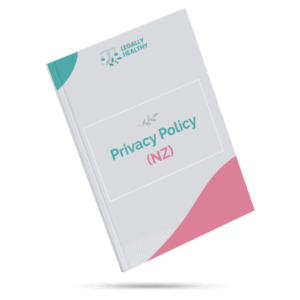The rise of AI-assisted note-taking tools like Heidi has revolutionised the way healthcare practitioners manage their consultations. While these tools can improve efficiency, they also raise critical privacy and compliance concerns, particularly when handling sensitive health information. Many practitioners have asked whether it is safe to use, so this blog provides general guidance on how to safely and legally integrate AI tools into practice while complying with Australian and New Zealand privacy laws.

Is Heidi Compliant with Australian and New Zealand Privacy Laws?
According to Heidi’s website, their system has built-in privacy and security features designed to comply with Australian Privacy Principles (APPs) under the Privacy Act 1988 (Cth) and align with New Zealand’s Information Privacy Principles (IPPs) under the Privacy Act 2020 (NZ). They claim that:
- Audio recordings are deleted immediately after notes are transcribed.
- Data is encrypted in transit and at rest.
- All data is stored within Australia, ensuring compliance with local data protection laws.
- Practitioners can control data retention periods, allowing them to choose how long transcribed notes remain accessible.
For full details, you can review Heidi’s privacy policy here: Heidi Privacy Policy
It is important to note that while Heidi states they comply with these privacy laws, practitioners should conduct their own due diligence to ensure their use of the platform aligns with their professional and legal obligations.
What About Data from New Zealand Practitioners?
According to Heidi’s website, all data is stored within Australia. This means that for New Zealand practitioners, client data is stored offshore. While Heidi states they align with New Zealand’s privacy laws, it is crucial that practitioners:
- Inform their clients that their data is stored outside of New Zealand.
- Obtain explicit consent before using Heidi for note-taking.
- Review and update their privacy policies to reflect this offshore data storage.
For further information on cross-border data storage compliance, practitioners should refer to guidance from the New Zealand Privacy Commissioner.
How Practitioners Can Protect Themselves and Their Clients
Despite Heidi’s built-in security measures, practitioners still bear the ultimate responsibility for ensuring they handle patient data legally and ethically. Here’s what you should do:
-
Obtain Explicit Client Consent
Before using Heidi in consultations, ensure your clients understand and consent to its use. This can be done through:
- Verbal consent recorded in patient notes.
- Written consent in your intake forms or privacy policy.
- Signage in your practice explaining how AI tools are used for note-taking.
Your explanation should cover:
- That audio is not stored and is deleted after transcription.
- That notes are temporarily stored before being finalised in their medical record.
- That Heidi states they comply with Australian and New Zealand privacy laws.
-
Set a Reasonable Data Retention Period
Heidi’s default setting for data retention is ‘never delete’. This should be adjusted to 3 days (or another period the practitioner is comfortable with), ensuring enough time to transfer notes to their client management software while minimising privacy risks.
Heidi allows you to choose how long notes are retained. To minimise privacy risks:
- Consider setting retention to 3 days – long enough to finalise notes but short enough to reduce unnecessary data storage.
- Ensure finalised notes are transferred to your client management system and removed from Heidi.
-
Update Your Privacy Policy
Your practice’s privacy policy should include:
- A statement that you use AI-assisted tools like Heidi for note-taking.
- Information on how client data is processed, stored, and deleted.
- Assurance that patient records are securely stored in your practice management system.
- A disclosure for New Zealand clients that data is stored in Australia.
If you need a template for this, you can find privacy policy resources tailored for health practitioners at Legally Healthy.
-
Ensure Secure Data Storage in Your Practice Management System
AI tools like Heidi should not be the primary storage location for client records. Make sure:
- All finalised notes are securely transferred to your practice management software.
- Your chosen software complies with privacy regulations in Australia and New Zealand.
- You have data backup and security measures in place.
-
Stay Up to Date with Privacy Regulations
Laws and AI technologies evolve rapidly. To stay compliant:
- Regularly review Heidi’s privacy policies for any updates.
- Ensure you comply with AHPRA, APRA (if relevant), OAIC (Australia), and the Office of the Privacy Commissioner (NZ) guidelines.
- Seek legal advice if you’re unsure about any aspect of AI data handling in your practice.
For more details on privacy compliance in healthcare, visit:
Final Thoughts
AI note-taking tools like Heidi offer incredible efficiency for healthcare practitioners, but they must be used responsibly. By obtaining consent, managing data retention, updating your privacy policy, and securing patient records, you can confidently use AI while staying compliant with Australian and New Zealand privacy laws.
If you have questions about legal compliance in your health practice, Legally Healthy provides legal templates and tailored legal services for Australian and NZ health practitioners.
📢 Stay Up to Date! If you’d like to receive more legal insights and updates on compliance for health practitioners, join our newsletter here: Legally Healthy Newsletter
⚠️ Disclaimer: This blog contains general information only and should not be taken as legal advice. While I am a lawyer, I am not a New Zealand lawyer, and this blog is not a substitute for specific legal advice tailored to your circumstances. If you require legal guidance, please consult a qualified professional in your jurisdiction.
Featured Products
-
Privacy Policy Template (AUS)
Original price was: $120.00.$97.00Current price is: $97.00. Incl GST -
Privacy Policy Template (NZ)
$97.00



